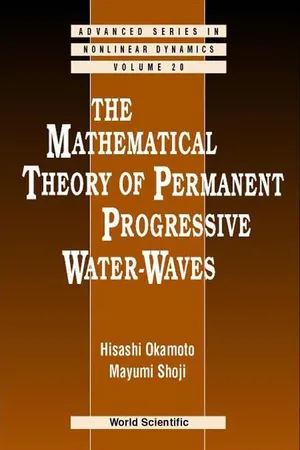
The Mathematical Theory of Permanent Progressive Water-Waves
- 244 pages
- English
- PDF
- Available on iOS & Android
The Mathematical Theory of Permanent Progressive Water-Waves
About this book
This book is a self-contained introduction to the theory of periodic, progressive, permanent waves on the surface of incompressible inviscid fluid. The problem of permanent water-waves has attracted a large number of physicists and mathematicians since Stokes' pioneering papers appeared in 1847 and 1880. Among many aspects of the problem, the authors focus on periodic progressive waves, which mean waves traveling at a constant speed with no change of shape. As a consequence, everything about standing waves are excluded and solitary waves are studied only partly. However, even for this restricted problem, quite a number of papers and books, in physics and mathematics, have appeared and more will continue to appear, showing the richness of the subject. In fact, there remain many open questions to be answered.
The present book consists of two parts: numerical experiments and normal form analysis of the bifurcation equations. Prerequisite for reading it is an elementary knowledge of the Euler equations for incompressible inviscid fluid and of bifurcation theory. Readers are also expected to know functional analysis at an elementary level. Numerical experiments are reported so that any reader can re-examine the results with minimal labor: the methods used in this book are well-known and are described as clearly as possible. Thus, the reader with an elementary knowledge of numerical computation will have little difficulty in the re-examination.
Frequently asked questions
- Essential is ideal for learners and professionals who enjoy exploring a wide range of subjects. Access the Essential Library with 800,000+ trusted titles and best-sellers across business, personal growth, and the humanities. Includes unlimited reading time and Standard Read Aloud voice.
- Complete: Perfect for advanced learners and researchers needing full, unrestricted access. Unlock 1.4M+ books across hundreds of subjects, including academic and specialized titles. The Complete Plan also includes advanced features like Premium Read Aloud and Research Assistant.
Please note we cannot support devices running on iOS 13 and Android 7 or earlier. Learn more about using the app.
Information
Table of contents
- Contents
- Preface
- Chapter 1 Introduction
- Chapter 2 Pure Capillary Waves
- Chapter 3 Gravity Waves
- Chapter 4 Capillary-Gravity Waves
- Chapter 5 Numerical Solutions of Mode (1 4) and (2 3)
- Chapter 6 Waves of Negative Parameters
- Chapter 7 Rotational Wave
- Chapter 8 Interfacial Progressive Waves
- Chapter 9 Solitary Waves
- Bibliography
- Index